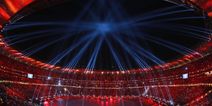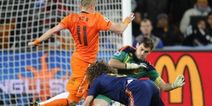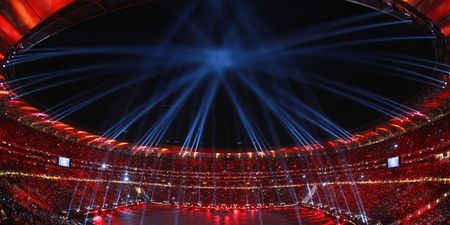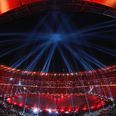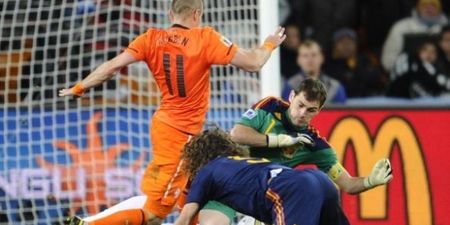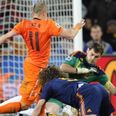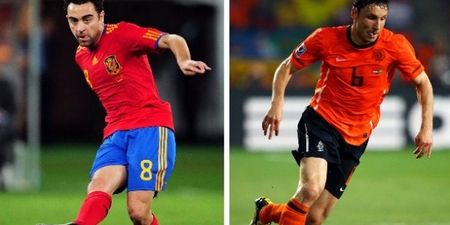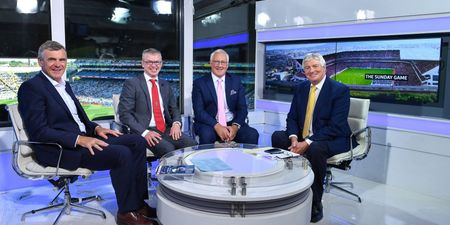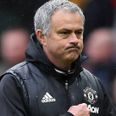
France would be the perfect fall-guys in South Africa’s journey to reconciliation and social cohesion, writes Ken Early in his first World Cup column for JOE.
Â
The World Cup is the biggest mass media event we have, but then the World Cup and the mass media have always been close: they were born around the same time and grew up together. The combination of a big international contest and the technology to transmit it live to a mass audience created a new storytelling opportunity, beautifully tailored to the age of propaganda. Before the Cup, shared international experiences had been limited to wars and plagues. Now countries could take events on the field and spin them into larger stories about themselves. World Cup footballers have always had this responsibility thrust upon them.
France 1938: Silvio Piola scores five goals for Italy, confirming that he is one of the greatest footballers of the day. But whether Piola likes it or not, millions of people also take his achievement as evidence (as if more were needed) that Fascism is the way of the future. Switzerland 1954: Helmut Rahn jinks left and hits a skidding shot into the net – what has he proved? Only that he has better studs than the Hungarian defenders – but for millions of Germans listening to Herbert Zimmermann’s ecstatic radio commentary, it means much more: “Wir sind wieder wer” – we’re somebody again.
The urge to see the actions of footballers as signifying some wider truth about the national moment probably originates in the same part of the brain that tells us we see the face of the Virgin Mary looking down from a cloud over Lough Derg. So though the media are much bigger and more varied than in the days of Rahn and Piola, the tendency towards grand narrative remains and has arguably grown even stronger.
France’s 1998 World Cup winning team soon became more famous as a symbol of a national racial integration that had not yet really happened. The fight between Roy Keane and Mick McCarthy was cast as a confrontation between the New (demanding, successful) and the Old (boozy, excuse-making) versions of Ireland. Germany’s football in 2006 was a sideshow to the larger national storyline in which Germans, blissed out in the role of global party hosts, felt able at last to wave their flags without worrying what everyone else was thinking.
Raymond Domenech’s France, a team wildly unpopular even in their own country, block the host nation’s path to social cohesion, reconciliation and nation-building
The 2010 World Cup may be the first in which the tournament is expected not just to provide the hook for a pretty storyline, but actually to effect the change in itself. The message from the organisers is explicit: what we are about to see over the next month is meant to transform the global perception of South Africa and of the African continent.
 Danny Jordaan (right), the head of the organising committee, says the opening match will be a historic moment comparable to the release of Nelson Mandela from prison. “It’s an assertion of who we are as Africans and what we can deliver… We want out of this event reconciliation, nation-building; we want social cohesion. We want South Africans to come together.”
Danny Jordaan (right), the head of the organising committee, says the opening match will be a historic moment comparable to the release of Nelson Mandela from prison. “It’s an assertion of who we are as Africans and what we can deliver… We want out of this event reconciliation, nation-building; we want social cohesion. We want South Africans to come together.”
Jordaan’s rhetoric shames the pessimists into silence. Nobody is against reconciliation and social cohesion; everybody wants the World Cup to be a success. The debate about whether it was right for a country with 40% unemployment and eight million people living in shacks to spend four billion dollars on a sports event was never conclusively settled, but it’s no longer relevant. The extra jobs and tourists that were promised never did arrive, but nobody cares. The overwhelming majority of South Africans can’t afford to buy tickets to a World Cup match, but every poll says they are delighted to have it. Even FIFA’s hideous slogan – “Celebrate Africa’s Humanity” – can’t bring them down. The country is surfing on a great wave of Who Cares and everyone is having the time of their lives.
Only one thing can ruin it all, and that is South Africa getting kicked out of its own World Cup at the group stage, and then having to watch everyone else fight it out, while the travelling fans shuttle between the rich enclaves where they have been told they are relatively safe from crime, complaining about the vuvuzelas. At that point, the gap between World Cup rhetoric and reality could become uncomfortably apparent, with far-reaching negative consequences for South Africa and perhaps the entire continent.
If Steven Pienaar’s team could beat Mexico in the opening match, it would do a lot to keep the dream alive. During the last World Cup, Mexico were heroic in their second-round match against Argentina, but lost to a late golazo by Maxi Rodriguez. That night in Leipzig a Mexican fan told me “Mexico played like never … but … we lost like always.” I was in awe of his phrasemaking power, until I discovered the next day that this phrase is the national motto of Mexican football. The Mexicans have lost 22 World Cup finals matches – more than any other country. Would it hurt to make it 23?
South Africa will still need one more win, and it won’t be against Uruguay, whose front pair of Diego Forlan and Luis Suarez will surely rip them to pieces. It will have to be against the other team in the group. And here perhaps we can see at last the hidden blessing of November 18, 2009. Were it not for Thierry Henry’s handball, it could be the Republic of Ireland blocking the host nation’s path to social cohesion, reconciliation and nation-building. Instead it is Raymond Domenech’s France, a team wildly unpopular even in their own country. Having cheated to get there, will Henry now have the gall to destroy the hopes and dreams of an entire continent? The watching world is willing the French to fall. For Africa. For Humanity.
Ken Early is chief football correspondent for Newstalk 106-108FM. He will write a regular column for JOE.ie throughout the World Cup.
Â

